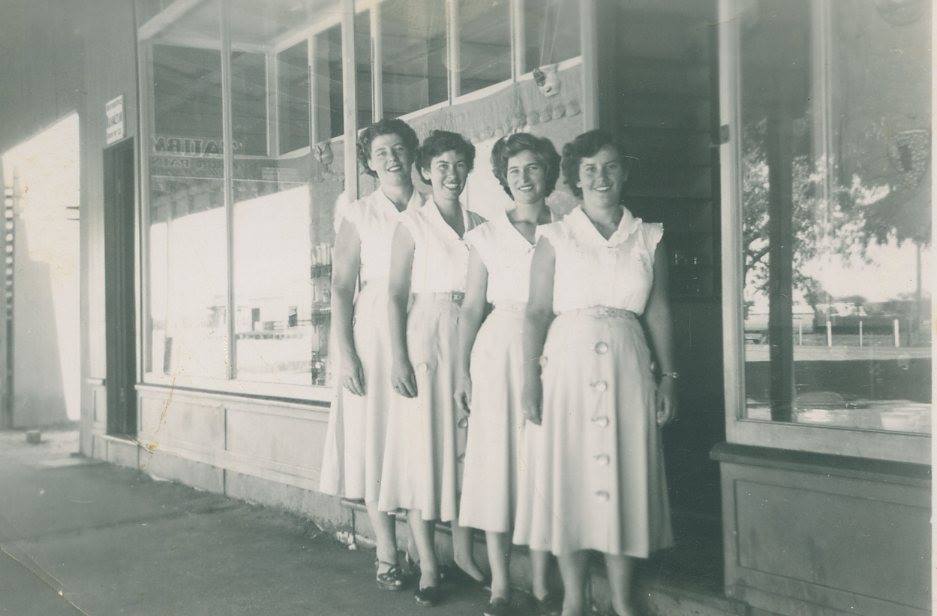It was common for women, wives and children to accompany their husbands and fathers on the road, and to live in the camps established along the routes and in the towns. Women who settled in town sometimes had paid employment.
Women were employed in businesses such as hotels and in homes as general or domestic servants. Some operated as dressmakers working from their own homes or for tailors, as the owners of businesses such as hotels (often inheriting the business when their husbands died), and in haberdashery shops or cafes (sometimes owned by their husbands). Midwifery and nursing were accepted occupations, but not all hospital nurses were trained in the early days of the town: ‘The doctor was assisted at his operations by any women strong enough to stand the sight of blood and the agonised screams of patients. Alcohol was the main anaesthetic and trained nurses were unknown‘ (Hoch, 2008, p.33). It was common for babies to be delivered by midwives who operated out of homes or private nursing homes such as Kenilworth Private Nursing Home. In the 1920s, Nurses Green, Long and Southgate were assisted by Miss D. Burke to attend the women. ‘Outside cases’ were also taken on by Nurse Green.
Deserted wives were common, abandoned by husbands to look after themselves and their children. If caught, the husbands were charged and, if unable to financially support their families, were jailed, leaving the women and children no better off. Prostitution was obviously an occupation for some, with newspapers reporting their convictions and the situation in detail.
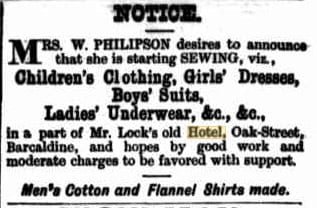
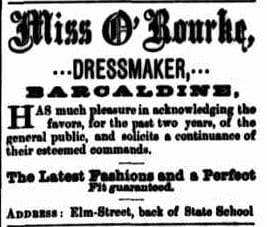
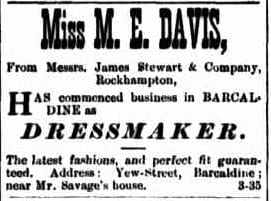
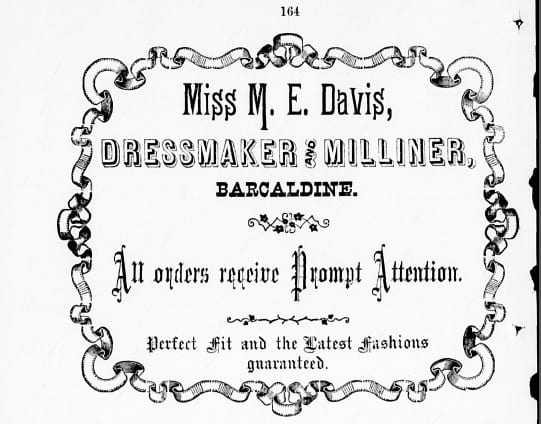
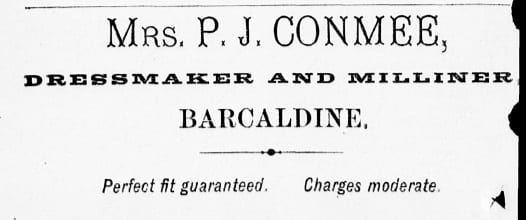
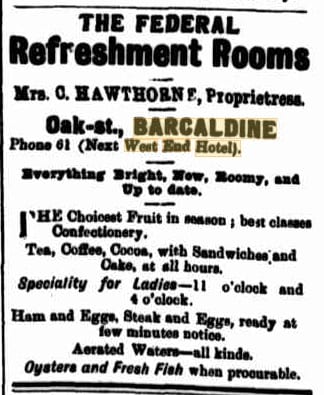
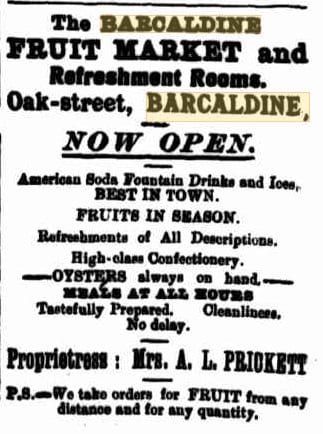
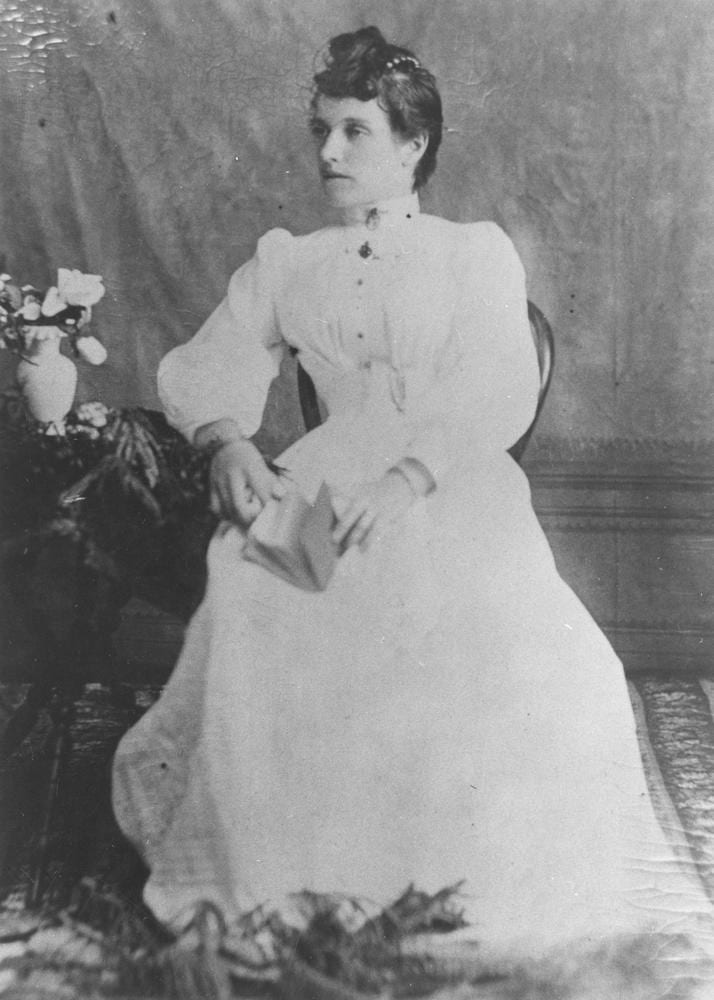
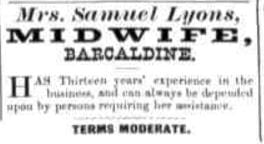
This example from the Western Champion 5 May 1902 highlights the complexity of the issues:
KEEPING A BAWDY HOUSE.
Sarah Ann Hayward was charged that at Barcaldine, on 27th October, 1901, she kept a house for purposes of prostitution.
Prisoner pleaded not guilty.
The Crown made nine challenges, and the prisoner one. The jury comprised :-E. Seaby, H. W. Whiting, T. Thompson, J. Gribble, Geo, Price, W. G. A. Bradford, H. Griffiths, J. L. Butler (foreman), C. Cromwell, W. Fothergill, John Egan, J. Cruise.
Mr. King opened the case at length, and called Ian J. Edg-Williams, who deposed to being sergeant of police at Barcaldine; on Friday evening, 25th October, he was on plain clothes duty, and in company with Constables Shelford and Richards went on Mr. Clapham’s verandah, which was directly opposite prisoner’s house; he saw prisoner come out of her house arm in arm with a man; the man was pulling the woman about, and made indecent motions. The two constables at this juncture were going away. It was a dear moonlight night. There was no fence round prisoner’s house. On the 27th he went to the same place; Constable Richards was with him from 8.30 to 9.30; he (witness) was there from 8.30 to 11.45; complaint had been made to him about the house; he was on Mr. Clapham’s verandah, and counted thirteen men going to the house. He saw the defendant going from the house towards the town ; a man went after her and said, “Come back here;” prisoner said she was going to the Police Station to give her daughter into custody, that she wasn’t going to be murdered by her own child ; the man said she was only a child ; prisoner then made use of an unprintable expression [previous to witness stating the expression used, Sergt. Williams called his Honor’s attention to the fact that a female was sitting in the body of the Court. His Honor asked the woman to retire, which she did covered with confusion. Prisoner went back into the house and re-appeared in her chemise; she said she was going to drown herself; a man came out of the house, caught hold of her and used an opprobrious expression. The man started pulling the woman about, and both retired into the house; he heard a row inside as if earthenware vessels were being thrown about. The house was quite open to the street. At a quarter to 12 witness sent Constables Richards and Shelford to the eastern side of defendant’s house, while he went towards the western side. He looked into the room and saw defendant and three men standing with their backs to the door; the woman was dressed in a chemise and a white cotton petticoat. The witness then detailed at length the improprieties he witnessed. He then went inside the house, and saw defendant’s daughter come out of a bedroom alone; the two constables went in with him. He asked, ” What’s all this row about ?” Defendant replied, “There’s no row here.” Witness said, “There has been a great row going on here for some considerable time.” He then asked, ” Are there any more men here ?” Defendant said “No.” Witness went into the bedroom the daughter had come out of and he saw a man lying on the bed face downwards partly across the bed; another man was lying on the floor with his clothes disarranged. He was positive the room was the one the daughter came out of. He then laid an information against prisoner.
Prisoner: I have no questions, your Honor. I will only say ; May God forgive him for all the untruths he has stated in that box.
Constable William Shelford corroborated the evidence of the Sergeant.
Cross-examined by prisoner: I am not aware a man named Duck tore the clothes off you; I never heard you call for help while I was on the verandah.
Constable Richards also gave corroborative evidence. No questions were asked.
R.E. Clapham deposed he was a cabinet maker, and resided in Ash-Street, Barcaldine; in October last prisoner lived directly opposite his house; she had been living there for about five months; she was the mistress of the house so far as he knew; the distance between his house and prisoner’s was about 1½ chains; that was the width of the street; he could distinctly see what went on there; he saw some very immoral conduct going on outside the house; he saw men pulling defendant about and heard them use very bad language; on the 27th October last saw fourteen or fifteen men there; saw defendant in her nightdress or chemise outside the house, while very bad language was going on. Witness corroborated the constables’ evidence as to the happenings outside the house. The conduct of defendant and people about her was very injurious to public morality; he made a complaint to the police, as prisoner’s conduct was an annoyance to him.
Cross-examined: I am sure you used the words attributed to you; there was a man running after you with a knife prior to the arrival of the police; I heard you say you were going to the police barracks for assistance ; I never heard you call out for help.
A. H. Heap, butcher, deposed to hearing bad language outside prisoner’s house.
This was the case for the Crown. For the defence, prisoner called James Hayward, who deposed: I am a laborer, living on Lagoon Creek at present; the prisoner is my wife : I have been supporting her for the past 20 years; I have been sending her money; his work took him away from home; I paid the rent of the house, which I rented from James Affoo.
Cross-examined: My wife once did a term of imprisonment for being a vagrant; with reference to me arriving at my home, hanging up my horse, and leaving again when I saw men there, I had to hurry to get my horse in the paddock; I was in the Police Court during the whole time the case was being heard; I did not hear my wife say she would plead guilty if the P.M. would deal with it.
By the Judge: In October last I was on Barcaldine station; I was away a fortnight; the Police Court case came on on the 31st October; I had been home two or three days when the case came on; I was not aware of anything improper going on during my absence.
Matthew Bannon and Michael Egan were called, but did not reply to their names.
Defendant shortly addressed the jury. She said Duck was the instigator of the row and tore the clothes off her. She complained to the Sergeant but he refused to assist her. On the Sunday night she called for ” Help” several times, but no notice was taken by anyone. The house had a bad reputation be fore she went into it, and she was not responsible for men going about the place.
The Judge, in summing up, explained the law on the matter, and drew attention to the fact that prisoner did not go into the box and deny the evidence advanced by the Crown, neither did she in her statement to the jury deny the acts of prostitution witnessed by the police. If the evidence of the Crown was to be believed there was not the slightest doubt but that the house was kept for immoral purposes.
The jury retired at 12.40 and were absent a quarter of an hour, when a verdict of guilty was returned.
The Judge said the evidence dearly showed that the house was a nuisance; if prisoner bad kept quiet there would probably have been no complaint. As prisoner had been in gaol for over five months awaiting trial he would order her to be kept imprisoned until the rising of the Court.
Prisoner: “Thank you, sir.”
The Court then adjourned for luncheon, and Mrs. Hayward walked off in company with her husband.
In 2001, accommodation and hospitality had only 6% of the shire’s employment. The leading employment sectors were agriculture (18%), construction (13.7%), wholesale and retail (14%), health and community services (9.3%) and education (8.2%). The shire’s median weekly individual income was $377, less than the region’s median of $407 but higher than the Queensland median ($359).
Women at work
